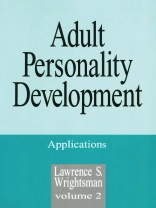Why do we, as adults, have the personality characteristics we do? No one explanation is accepted by all; however, in this greatly expanded version of his earlier book, Personality Development in Adulthood, Wrightsman helps us understand and organize the three broad theoretical approaches to explain psychological changes during the period from adolescence to the onset of late adulthood. Each of these approaches–early formation theories, stage theories, and the dialectical approach–are described and contrasted in order to help us more easily compare our experiences with those of others. Case histories, relevant current events, and boxed inserts are used throughout the book to illustrate important concepts in a thought-provoking, lively manner. Written in a compelling, non-technical style, the book is accessible to students and interested readers from all disciplines, especially psychology, clinical and developmental psychology, aging, family studies, sociology, gender studies and nursing.
Tabla de materias
Conceptions of Personality Development in Adulthood
Psychoanalysis as an Early-Formation Theory
Theorists′ Lives
Do They Determine Their Theories?
Erikson′s Theory of Psychosocial Development
Psychobiography and Personality Development in Adulthood
Contemporary Stage Theories
Havighurst and Gould
Contemporary Stage Theories
Daniel Levinson
The Dialectical Approach
Change Versus Consistency in Personality Development
An Attempt at Integration












